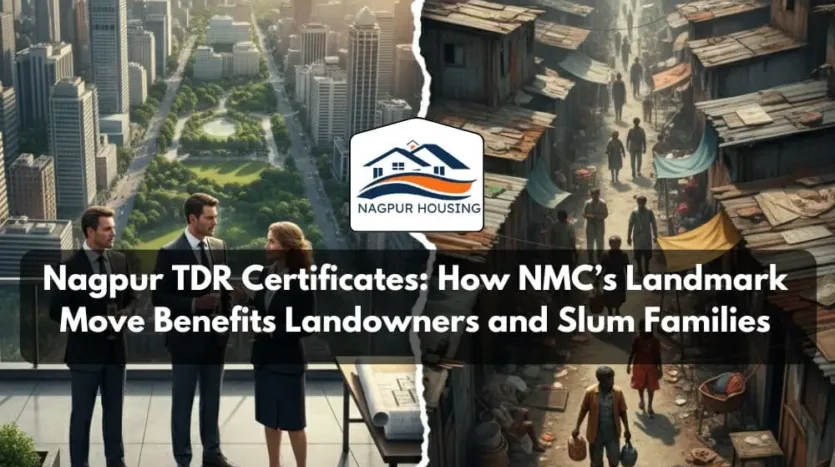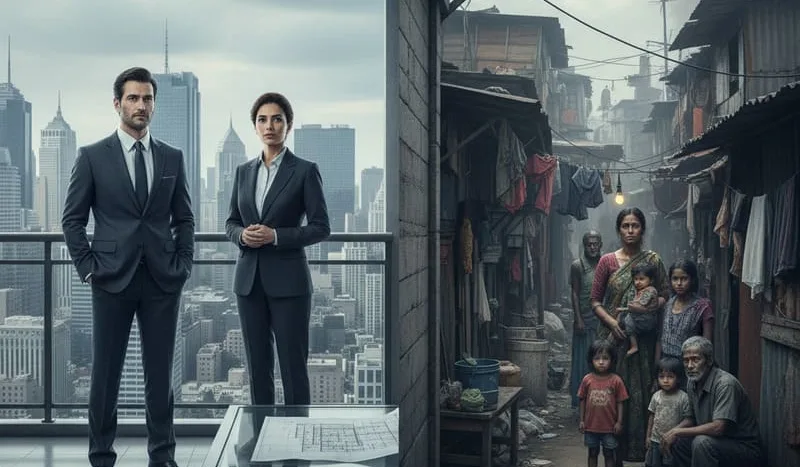Nagpur TDR Certificates: How NMC’s Landmark Move Benefits Landowners and Slum Families
Nagpur has often been in the news for its rapid development, metro expansion, and rising importance in the state of Maharashtra. But recently, the city made headlines for something truly unique something no other municipal body in the state has ever done.
For the first time in Maharashtra, the Nagpur Municipal Corporation (NMC) has begun distributing Transferable Development Rights (TDR) certificates to private landowners whose lands were long encroached upon by slum dwellers. This move is not just administrative but historic, as it attempts to resolve a decades-old conflict between landowners and residents living without proper legal rights.
Launched under the guidance of Chief Minister Devendra Fadnavis, this initiative is being seen as a win-win for both sides. Landowners finally receive compensation in the form of TDRs, while slum dwellers are promised legal recognition and lease rights.
This is more than just a policy, it is a story of justice, compromise, and new beginnings.
You might like: Nagpur’s Green Transformation: NMC’s 4 Theme-Based Gardens & Real Estate Impact
What Exactly is TDR?
To understand the importance of this decision, let’s first break down what Transferable Development Rights (TDR) mean.
- In simple words, TDR is a certificate given by the government that allows the owner to sell or use additional development potential somewhere else in the city.
- It works like a token of compensation. If your land is acquired or cannot be used because of public reasons, instead of cash, the government gives you TDR.
- This TDR can be sold in the open market, often to builders and developers who need extra floor space index (FSI) for their projects.
In Nagpur’s case, TDR certificates are being given to the landowners whose properties were taken over by slum settlements. This means they are finally getting something in return after years of being unable to use their own land.
The Long Struggle of Landowners in Nagpur
For decades, several private plots in Nagpur remained under encroachment. These were not empty pieces of land, many had entire slum clusters built on them.
- Landowners could neither build nor sell.
- Encroachers, on the other hand, had no legal rights because they did not own the land officially.
- This created a deadlock, with neither side benefiting.
Over time, the situation became more complex. Families in slum clusters grew, children were born and raised there, and the encroachments turned into permanent homes. Yet, in legal records, the land still belonged to its rightful owners.
This situation caused frustration for landowners, who saw their assets locked away without any benefit, and uncertainty for slum dwellers, who lived in constant fear of eviction.
The Breakthrough: NMC’s Initiative
The deadlock finally began to break when the Nagpur Municipal Corporation (NMC) decided to act. Under the leadership of CM Devendra Fadnavis, the city devised a way to compensate landowners while regularising slum settlements.
On Tuesday, in a small but historic ceremony, Municipal Commissioner Abhijeet Chaudhari handed over TDR certificates to 19 plot holders from Mouza Babulkheda. The event was attended by Deputy Commissioner Milind Meshram, Town Planner Rituraj Jadhav, and CDSF head Leena Buddhe.
This marked the beginning of a new chapter for both landowners and slum residents. With this, Nagpur became the first municipal body in Maharashtra to compensate official landowners of private land in such a manner.
The Case of Babulkheda: A Landmark Example
The first rollout of the scheme happened in Babulkheda, where the Ramteke Nagar slum has been spread across:
- 43 private plots, and
- An 8-acre parcel owned by Indraprastha Society.
Out of these, 19 landowners and Indraprastha Society applied for TDR, and their applications were accepted. The certificates were distributed proportionately based on the size of each plot.
The remaining landowners also have the option to apply in the next phases.
This single example highlights how the initiative is not just theoretical, it is being implemented in reality, step by step.
What Happens to the Slum Dwellers?
One of the most sensitive aspects of this initiative is how it impacts slum residents. After all, these families have lived on the land for years, in many cases decades.
Here’s how the scheme benefits them:
- NMC will acquire the land through TDR – This means the land will now be officially taken over by the municipal corporation.
- It will be registered under NMC’s name – giving the government legal rights over the land.
- Slum residents will get leases – Once the land is in NMC’s control, the slum dwellers will be given government-approved leases, ensuring they cannot be arbitrarily evicted.
- Permanent leases will follow – Soon, these leases will be distributed formally, providing long-awaited legal security to thousands of families.
Thus, the scheme provides hope and dignity to slum dwellers who had always lived in uncertainty.
Why is This Move So Important?
The decision to issue TDR certificates is being called a game-changer in urban policy. Here’s why:
- For landowners: They are finally being compensated fairly for land they couldn’t use. Instead of waiting endlessly for disputes to resolve, they now have a tradable certificate that brings real financial value.
- For slum dwellers: They gain legal recognition and security, ensuring their homes are no longer “illegal” in the eyes of the government.
- For the city: It resolves long-pending land disputes, reduces litigation, and opens new opportunities for planned development.
It is one of those rare solutions that tries to balance the interests of both sides.
Voices From the Ground
During the ceremony, many landowners expressed relief. For years, they had written petitions, fought cases, and hoped for a solution. Now, with TDR certificates in hand, they finally see light at the end of the tunnel.
On the other hand, slum residents are waiting eagerly for the lease distribution. For them, owning a piece of paper that confirms their right to stay is nothing short of a dream come true.
Challenges Ahead
While the initiative is groundbreaking, it also comes with challenges.
- Speed of implementation: Many more landowners are waiting. The process must be quick and transparent to build trust.
- Market value of TDRs: Landowners will only benefit if the TDRs fetch good value in the real estate market.
- Slum management: Once leases are distributed, the NMC will need to ensure these areas are developed with proper infrastructure, water, sanitation, and roads.
- Transparency: Any hint of corruption in allocation could weaken the credibility of the scheme.
If handled carefully, Nagpur’s experiment can become a model for other cities in Maharashtra and even across India.
A Vision for the Future
This initiative is more than a policy, it reflects a new way of looking at urban problems. Instead of treating landowners and slum dwellers as adversaries, the scheme treats them as stakeholders in the same city.
If successful, this could pave the way for similar solutions in Mumbai, Pune, Nashik, and other cities where land disputes and slum encroachments are common.
Nagpur has once again shown that it is not just the geographical centre of India but also a centre of innovative governance.
Conclusion: A City Leading the Way
The story of TDR certificates in Nagpur is about justice delayed but not denied. It is about recognising the struggles of both landowners and slum dwellers and offering a solution where both sides benefit.
By being the first in Maharashtra to issue TDR certificates for encroached private land, Nagpur has set a new benchmark in urban policy.
This is not just a local development, it is a message that problems which seem unsolvable can indeed be resolved with creativity, political will, and compassion.
As thousands of families in Babulkheda await their lease papers and as landowners start trading their TDRs, Nagpur is quietly scripting a story of hope, balance, and progress that the rest of the state, and the country, will be watching closely.












